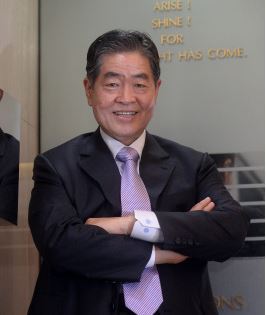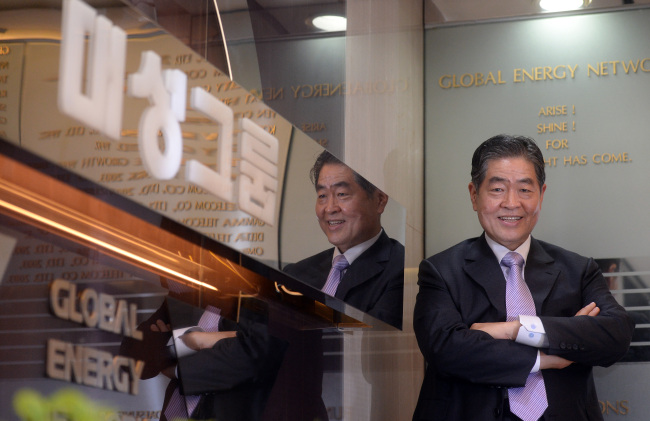[Newsmaker] Daesung chief explores new territory for energy transition
By Korea HeraldPublished : Dec. 16, 2016 - 19:57
Younghoon David Kim, chairman of Daesung Group, a South Korean conglomerate specializing in the energy business, has a unique and grand mission in mind: finding individuals like Michael Faraday.
Stressing that the world is on the verge of an energy transition, Kim believes the time is ripe for entrepreneurs like him to find the brightest minds to bring about a paradigm shift from a fossil fuel-based economy to one based on new sources of energy. To open a new chapter in human history, the world needs scientists who can unlock the mysteries of nature through passion and creative ideas.
“It always fascinates me,” Kim said as he sat down with The Korea Herald for an interview on Dec. 7.
Kim was talking about the life of Faraday, the 19th century English scientist who discovered electromagnetic induction accidentally when moving a magnet through a loop of wire. The electromagnetic rotation that Faraday discovered eventually developed into an electric motor, sparking the second industrial revolution.
“It was a discovery, not an invention. ... It was how the electricity power business all began and it all started from pure scientists full of passion. We need to find that kind of people now,” he said.

The search for technological visionaries is taking shape.
As the chairman of the World Energy Council, the world’s largest organization on energy, in terms of membership, he plans to create a platform called “Inventor-Investor Encounter” to bring together innovative technologists and investors with true entrepreneurial spirit.
“We are going to have a gathering in the next three years to have the brightest minds meet the deepest pockets, so that they can discuss ways to industrialize innovative technologies to fast-forward the energy transition.”
In October, Kim was inaugurated as the head of the WEC, a 93-year-old organization which aims to be the “United Nations for energy.” The council represents more than 3,000 members from 93 countries. Kim is the first Korean and second Asian to lead the council.
The council will hold the World Energy Congress, known as the Energy Olympics, in Abu Dhabi in the United Arab Emirates in 2019 to address the challenges and opportunities of the ever-evolving industry and the role of technology in the course of historic transition.
Fossil fuels may no longer be the dominant energy source in the future, as seen by the increase in renewable energy and the use of electric vehicles.
According to recent reports by Royal Dutch Shell and the Organization of the Petroleum Exporting Countries, demand for oil will reach its peak by 2030. But noncombustion energy sources -- wind and solar power -- have problems too. They are not reliable, causing problems of power intermittence, he said.
An energy storage system is key to solving such a dilemma. But it costs a lot, and is not able to handle power distribution on a large scale.
“This is why we should all go back to the basics. Frameworks on a state level are important, but we will all end up with barriers if we don’t have dedicated people like Faraday who think deeply enough to solve the dilemma we are facing.”
The backbone of Kim’s drive for technological transition comes from his own sense of curiosity, strong Christian belief and, perhaps, a thirst for innovation and new possibilities.
Kim is the head of a South Korean energy firm that distributes and supplies fuel for residential use, a part of the family business founded by his father Kim Soo-keun.
Kim is the third son of the founder and elder brother of Kim Sung-joo, chairwoman of Sungjoo Group and owner of luxury fashion brand MCM.
Stressing that the world is on the verge of an energy transition, Kim believes the time is ripe for entrepreneurs like him to find the brightest minds to bring about a paradigm shift from a fossil fuel-based economy to one based on new sources of energy. To open a new chapter in human history, the world needs scientists who can unlock the mysteries of nature through passion and creative ideas.
“It always fascinates me,” Kim said as he sat down with The Korea Herald for an interview on Dec. 7.
Kim was talking about the life of Faraday, the 19th century English scientist who discovered electromagnetic induction accidentally when moving a magnet through a loop of wire. The electromagnetic rotation that Faraday discovered eventually developed into an electric motor, sparking the second industrial revolution.
“It was a discovery, not an invention. ... It was how the electricity power business all began and it all started from pure scientists full of passion. We need to find that kind of people now,” he said.

The search for technological visionaries is taking shape.
As the chairman of the World Energy Council, the world’s largest organization on energy, in terms of membership, he plans to create a platform called “Inventor-Investor Encounter” to bring together innovative technologists and investors with true entrepreneurial spirit.
“We are going to have a gathering in the next three years to have the brightest minds meet the deepest pockets, so that they can discuss ways to industrialize innovative technologies to fast-forward the energy transition.”
In October, Kim was inaugurated as the head of the WEC, a 93-year-old organization which aims to be the “United Nations for energy.” The council represents more than 3,000 members from 93 countries. Kim is the first Korean and second Asian to lead the council.
The council will hold the World Energy Congress, known as the Energy Olympics, in Abu Dhabi in the United Arab Emirates in 2019 to address the challenges and opportunities of the ever-evolving industry and the role of technology in the course of historic transition.
Fossil fuels may no longer be the dominant energy source in the future, as seen by the increase in renewable energy and the use of electric vehicles.
According to recent reports by Royal Dutch Shell and the Organization of the Petroleum Exporting Countries, demand for oil will reach its peak by 2030. But noncombustion energy sources -- wind and solar power -- have problems too. They are not reliable, causing problems of power intermittence, he said.
An energy storage system is key to solving such a dilemma. But it costs a lot, and is not able to handle power distribution on a large scale.
“This is why we should all go back to the basics. Frameworks on a state level are important, but we will all end up with barriers if we don’t have dedicated people like Faraday who think deeply enough to solve the dilemma we are facing.”
The backbone of Kim’s drive for technological transition comes from his own sense of curiosity, strong Christian belief and, perhaps, a thirst for innovation and new possibilities.
Kim is the head of a South Korean energy firm that distributes and supplies fuel for residential use, a part of the family business founded by his father Kim Soo-keun.
Kim is the third son of the founder and elder brother of Kim Sung-joo, chairwoman of Sungjoo Group and owner of luxury fashion brand MCM.

Born in Daegu in 1952, Kim studied law and public administration at Seoul National University and earned a Master of Business Administration and Master of Comparative Law from the University of Michigan Graduate School.
In 1983, he went to Harvard to study global economics, but a year later he decided to study theology at Harvard Divinity School.
Daesung Group, formerly based in Daegu, grew big in the 1960s when the Korean government encouraged the use of coal to stop people from cutting down trees for fires.
With the company making a fortune, Kim’s father was offered to turn to the semiconductor business. But he declined, as he was doing well already. The offer might have gone to late Samsung Group founder Lee Byung-chull, who was then running a flour business in the same city.
“I feel sad when thinking about it. It feels like the lost 50 years (for Daesung),” he said.
“This is why I acquired Daesung Private Equity Inc. Today, the company is making positive progress in the bio and contents business.” Apart from the energy business, Daesung has been investing in publications, online platforms, fashion and movies.
Kim has also been paying a keen interest to lab works that have the possibility of becoming a new paradigm.
“I want to explore new territories by taking the road not taken,” he said. “And I am very excited about the possibilities of microbial energy.”
When traveling abroad, Kim frequently visits labs around the world, checking out the latest works himself.
From robots run by microbial fuel cells fed by organic waste to electrolysis cells that enable microbes to produce methane by feeding them electrons, Kim believes the color of future energy sources will shift from black to blue, from dead organisms to living organisms from the ocean.
“I was amazed when I first saw microbial cells generating electricity, like the first moment I learned about Faraday’s discovery of electromagnetic induction,” he said.
“He knew that his discovery would make a fortune and may have become a billionaire, like Bill Gates. But he left it open to the public by not seeking patents. If he did (privatize the discovery), the world may not have gone through the technological advancements we enjoy today.”
Pursuing public good and the growth of a private business may sound contradictory.
But Kim believes there is an intersection between the two.
“I want to be remembered as an entrepreneur who had the courage to follow the light at the end of tunnel,” he said.
“A proactive visionary like Faraday who dedicated his life for the public good in pursuit of the mystery of the world that God has created.”
By Cho Chung-un (christory@heraldcorp.com)
-
Articles by Korea Herald


![[Exclusive] Korean military set to ban iPhones over 'security' concerns](http://res.heraldm.com/phpwas/restmb_idxmake.php?idx=644&simg=/content/image/2024/04/23/20240423050599_0.jpg&u=20240423183955)

![[Graphic News] 77% of young Koreans still financially dependent](http://res.heraldm.com/phpwas/restmb_idxmake.php?idx=644&simg=/content/image/2024/04/22/20240422050762_0.gif&u=)



![[Pressure points] Leggings in public: Fashion statement or social faux pas?](http://res.heraldm.com/phpwas/restmb_idxmake.php?idx=644&simg=/content/image/2024/04/23/20240423050669_0.jpg&u=)










